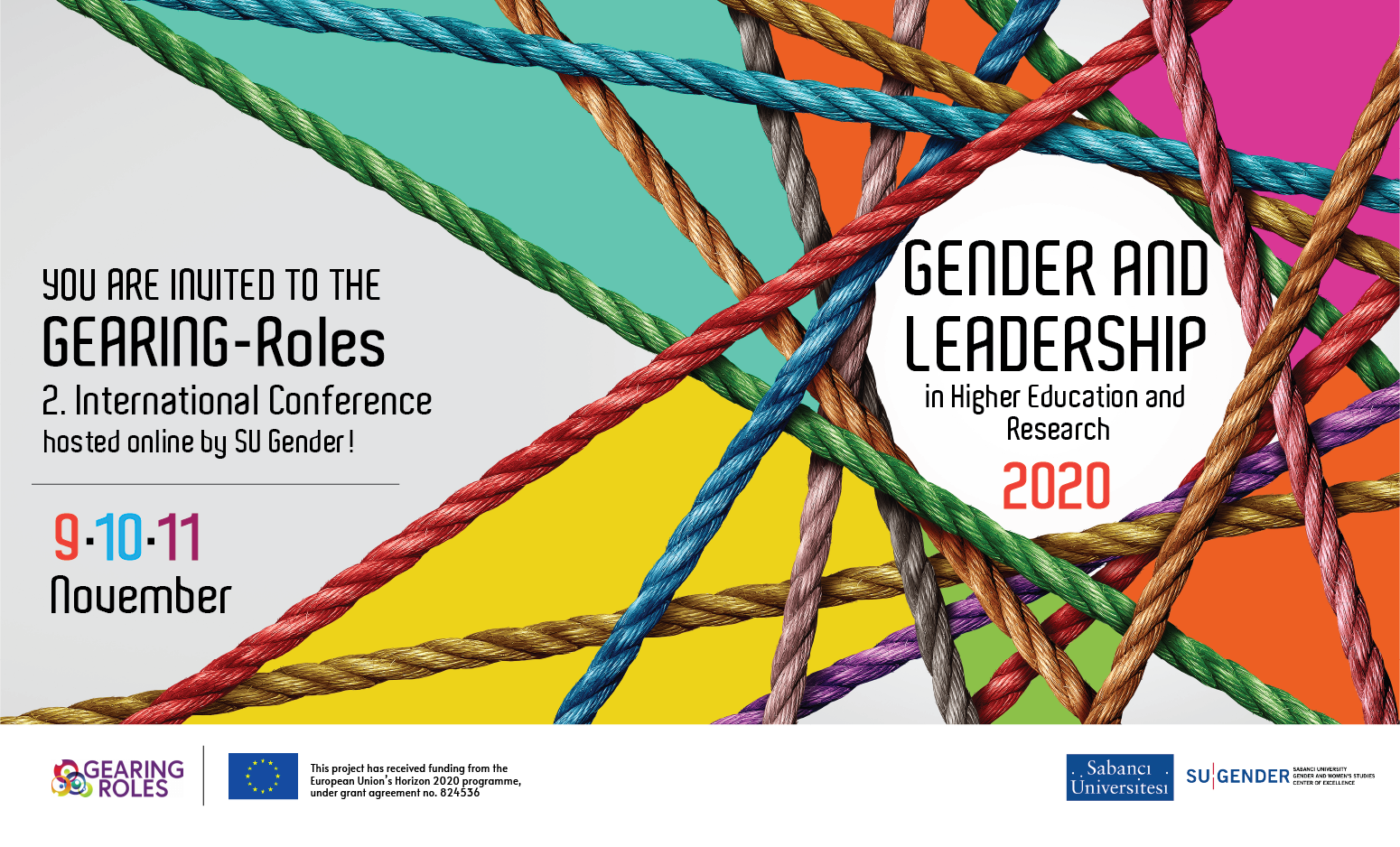
16 Dec Reflections: GEARING’s Second Annual Conference (Nov 9 -11, 2020)
A sincere thank you to everyone who attended our 2020 Annual Conference! It was a fun, thought-provoking three days of lively discussions on Gender and Leadership in Higher Education and Research. The conference built on lessons learned in the GEARING project – which is implementing six Gender Equality Plans – and explored new directions & challenges for inclusion & leadership
The conference was organized by SUGender and (were it not for the pandemic) would have taken place in their home locale of Istanbul. The conference, nonetheless, began with a virtual ‘feminist walk’, highlighting locations important to the lives of notable women who have lived in the city.
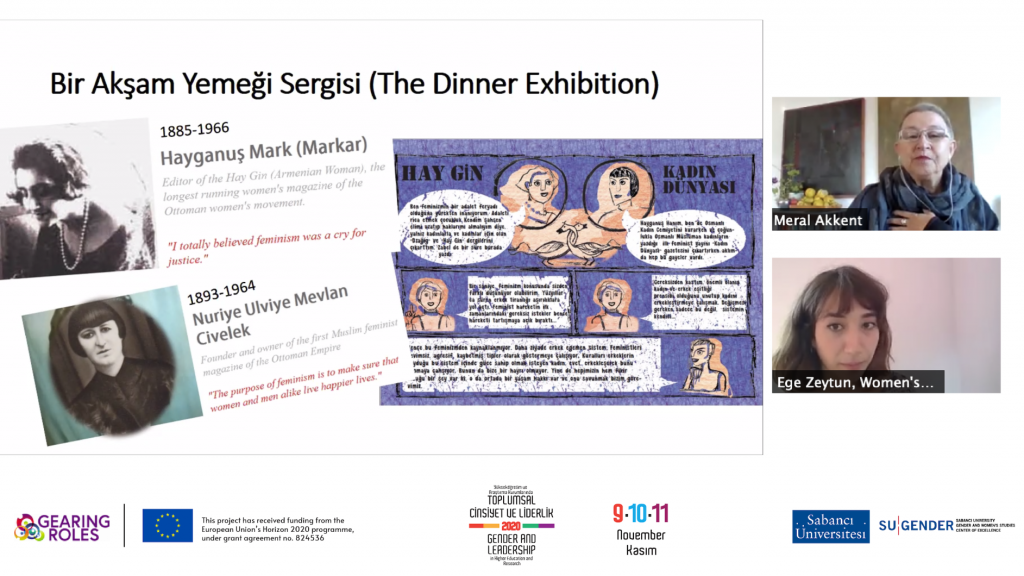
Moving online afforded an opportunity to expand the conference’s reach. Almost 1000 people registered for the conference, of which about 400 people joined via Zoom and 335 followed on SUGender’s YouTube page – where recordings of conference sessions are available. Since the conference ended, more than 400 people have watched the recordings.
After a welcome from SU, the keynote speech was delivered by Mangala Subramaniam, Professor of Sociology and Butler Chair and Director of the Susan Bulkeley Butler Center for Leadership Excellence at Purdue University. Subramaniam stated that the conference is
“much needed and provides a platform to discuss transformation of institutions to open paths for women to take leadership responsibilities. I think leaders need to think of three key ideas as central to institutional transformation: transparency, accountability, and inclusive excellence. These dimensions will provide women the opportunity to serve on leadership roles. You can be a better leader by investing in others [and ensuring] diversity in leadership roles. Institutional transformation entails doing the ‘work’ of leadership.
The work of emotional and intellectual labor, I know, involves enormous time and effort. Doing the ‘work’ of leadership requires alliance building and collaborations, not merely at an individual level but at the institutional level. It requires transparency and rejection of hidden agendas in order to create broader spaces of inclusion on campus to enable broad scale impacts to transform institutions. The necessity for inclusionary work is even more prominent during the current COVID-19 crisis faced by all including higher education institutions.”
The conference continued with a Wikipedia digital activism marathon. During the workshop, students in multiple countries added content to Wikipedia pages discussing women and LGBTI+ individuals. This event included a presentation from Gülin Çavuş, Chief Editor at Teyit.org, on how to find accurate and non-sexist information online. The Turkish Wikimedia User Group then held an interactive presentation in Turkish on how to add content to Wikipedia. At this link, workshop participant and Deusto student María Lertxundi discusses translating the profile of Kurdish-Turkish writer and politician Leyla Zana into Basque.
The conference’s four panel discussions explored decision-making & participation in civil society and urban governance; equality and inclusion in universities and research organizations; Institutional Challenges and Resistances; and Actions, Strategies, Solidarities.
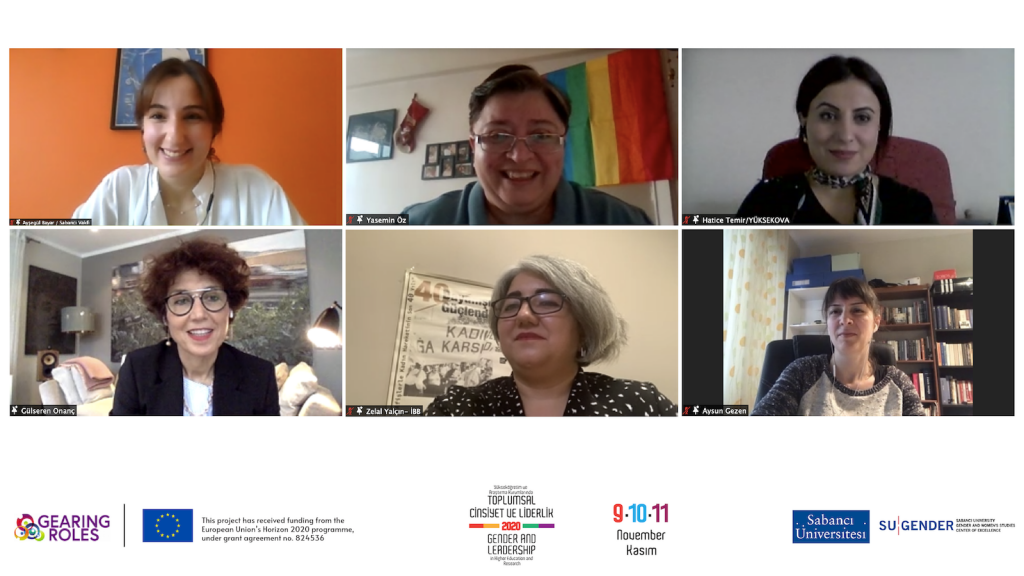
The first panel – Gender Equality, Decision Making and Participation in Civil Society and Urban Governance – was chaired by Ayşegül Bayar, Programs Coordinator at the Sabancı Foundation. The panel discussants were representatives from Turkish Civil Society including Aysun Gezen, Co-Chair at the Confederation of Public Employees’ Trade Unions; Gülseren Onanç, Chair at SES Association; Yasemin Öz, Attorney at law at Kaos GL & KA.DER; Hatice Temir, Board Chair at YUKADER; Zelal Yalçın, Social Policies Coordinator at Istanbul Metropolitan Municipality. The panel was in Turkish and translated live at the conference, though the recording is available in the original language only.
The panellists discussed topics relating to solidarity, transformation and feminist leadership to help members of under-represented groups gain a voice in institutional leadership:
- The panel began by praising female leadership during the COVID-19 pandemic, especially the heads of state of New Zealand, Taiwan, Germany and Denmark;
- All panellists connected gender representation to sexual orientation, immigration, religion, ethnicity and poverty;
- Many panellists discussed the importance of teamwork – globally and locally, between men and women, and amongst organizations. Panellists suggested that gender equality and a sustainable world are only possible with global solidarity;
- Panellists discussed the importance of gender-sensitive and egalitarian leadership, coupled with defined mechanisms such as female leadership quotas, women assemblies, co-chair approaches, nurseries, safe public spaces, and domestic violence shelters. These implementations must be measurable, transparent and shared with the public.
- The panellists argued that women must have voices at different levels of decision-making and social sectors, not just leadership at the top. To facilitate this, associations should engage with diverse women and listen to their stories about the barriers they face, including stereotypes and glass ceilings.
- Panellists highlighted the importance of shifting public discourse around gendered roles, particularly with regards to assumptions about women meeting primarily to gossip, that young girls should not go to school, and that it is a woman’s duty to serve her husband, raise children and do housework.
- The panellists recognised that these mechanisms and changes will not bring about an immediate transformation unto themselves, but rather generate a roadmap to facilitate female empowerment and leadership.
The next panel – Gender Equality Action Plans: Equality and Inclusion in Universities and Research Organizations – brought together participants in GEARING Roles and its sister projects EGERA, SAGE, and PLOTINA to share their experiences in establishing gender equality plans. They discussed common institutional issues faced across Turkey and Europe, and shared strategies from their experiences about what did and did not work. GEARING’s Gülru Göker, Researcher at Sabancı University Gender and Women’s Studies Center of Excellence, moderated the discussion. The panellists were Ayşe Ayata, Professor of Political Science and Public Administration Department Chairperson at the Middle East Technical University (EGERA); Mary Lou O’Neil, Director at Kadir Has University Gender and Women’s Studies Research Center (SAGE); Nurseli Yeşim Sünbüloğlu, Gender Equality Specialist at the Özyeğin University (PLOTINA); and Ayşe Gül Altınay, from SU Gender at Sabancı University (GEARING).
Takeaways from the conversation in this panel included:
- All panellists discussed the importance of building a culture of institutionalized, intersectional gender equality as a product of co-creation and solidarity, in which all groups are included, to create sustainable change;
- All projects shared focal points of mainstreaming gender perspectives in the curriculum, encouraging work-life balance, and promoting women to leadership roles;
- Many panellists credited the support of their own institutions’ leaders for advancements there in gender equality, showcasing the importance of buy-in from senior members of staff;
- Panellists discussed resistances and challenges including collecting desegregated data; resistance to positive discrimination; material resources; and even issues acknowledging the existence of discrimination and issues with work-life balance. Recommendations to tackle these challenges included a focus on co-creation, as well as incorporating gender equality into themes and concepts (such as sustainability goals) already institutionally-established.
- All panellists discussed the importance of including diverseindividuals within the university in decision-making processes – including academics, HR, administrators, service staff, and students. Engaging with men and encouraging them so see gender equality as ‘their’ issue was another important consideration – for example, increasing paternity leave from five days to 10, one panellist noted, had been received extremely favourably.
- Political issues in Turkey were noted as barriers to engaging with LGBTIQ students, migrants and refugees. Some panellists stated that their projects engaged with diverse groups but available data did not adequately capture diverse groups. Panellists noted the need to expand notions and understanding of intersectionality to diverse factors such as ethnicity, class and ability;
- Sustainability was considered a difficult task, particularly due to growing anti-gender sentiments in the political climate of Turkey and Europe;
- Cooperation and communication amongst sister projects and other change-makers was considered essential to enabling institutional change.
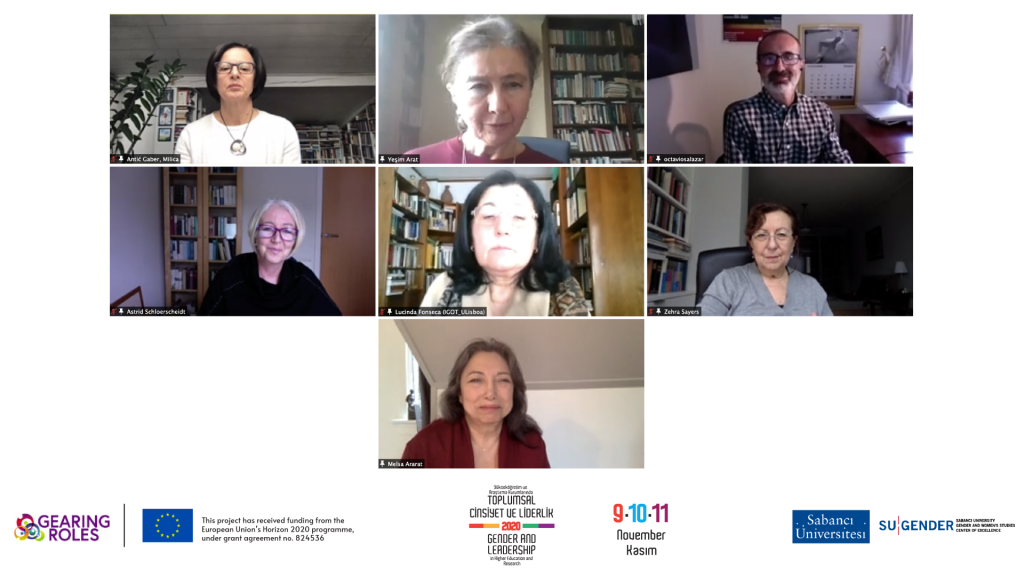
The third panel – Gender and Leadership in Higher Education and Research: Institutional Challenges and Resistances – was moderated by GEARING’s Inge Bleijenbergh from the Institute of Management Research at Radboud University, who began by discussing the importance of leaders and change agents in institutions. Jon Pizarro Perez and Leire Gartzia Fernandez from Deusto University then presented their analytic work on gender equality leadership in the GEARING Roles Project. They stated that as leaders are essential to achieving institutional change, representation in leadership is essential. They presented some of the obstacles women face when accessing management positions including institutional culture, difficulties in balancing work and private life, the ‘equality mirage’, concepts of meritocracy, and feelings of ‘impostor syndrome’ among women in leadership roles. They concluded that identifying resistances, encouraging organisational cultural change, raising awareness of the issue and demonstrating unconscious bias are all crucial to achieving greater equality in leadership.
Next, individual leaders from diverse organisations discussed their gender equality work. These panellists included Simonetta Manfredi, Associate Dean for Research and Knowledge Exchange for the Business School from Oxford Brookes University; Karin Jaanson, Executive Director from the Estonian Research Council; Fuat Keyman, Vice Rector for Institutional Affairs and Social Impact and Director of the Istanbul Policy Center at Sabancı University; Roman Kuhar, Professor of Sociology at the Faculty of Arts and Dean of the Faculty of Arts from the University of Ljubljana; Mário Vale, Director of CEG, Geographic Institute and Spatial Planning from the University of Lisbon; and Eduardo Ruiz Vieytez, Vice Rector for Community Strategy from Deusto University.
The panellists discussed their personal and professional involvement with gender equality and mentioned some of the following issues, concerns and considerations for achieving gender equality:
- Many panellists discussed ‘second generation’ or ‘indirect’ discrimination. Panellists agreed that it is often hard to move away from the discourse that gender equality exists already and explain that gender equality is not just legal equality or equality of opportunities, but how norms are framed and implemented;
- Panellists mentioned that appeals to ‘meritocracy’ were often used to shut down conversations, even as meritocracy is hard to define or measure;
- Positive action was also brought forward as an important step towards equality;
- Speakers discussed challenges they faced in their home countries and organizations. Examples included inequality in decision-making bodies; the difficulties of collecting sex-aggregated data; underrepresentation in women in research contracts (which gives them a disadvantage in career progression); the global anti-gender movement which has denounced gender studies; and moving from gender equality plans to actual practices;
- Panellists credited organizational culture as essential to gender equality plans’ successes.
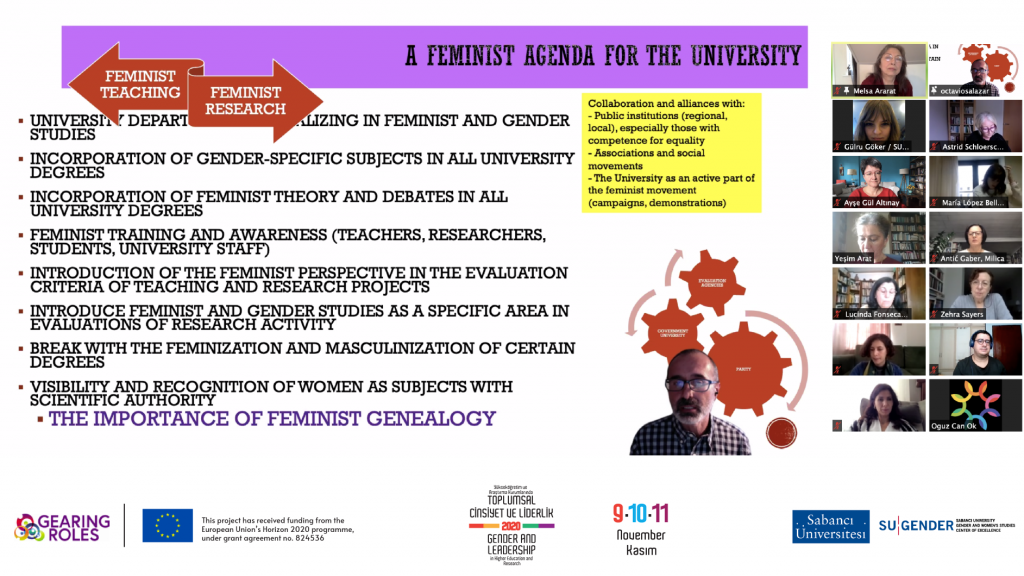
The fourth panel – Gender and Leadership in Higher Education and Research II: Actions, Strategies, Solidarities – was moderated by Yeşim Arat, Former Vice Rector for Academic Affairs and Professor of Political Science and International Relations at Boğaziçi University.
The conversation began with a presentation “From ‘He for She’ to ‘We for She’: Strategies and solidarities that support leadership for an equitable future!” by Melsa Ararat, Director, Corporate Governance Forum at the Sabancı University. Melsa counted anyone with influence to be in a ‘leadership’ position, though the term is often associated with men and masculinity. She criticised Sheryl Sandberg’s book Lean In and instead suggested ‘don’t lean in, lean out – think about what you are leaning into, the environment and how you feel about it.’ That is – when women behave like men, gender equality doesn’t materialise. It is important therefore that a leadership role is not gendered, and doesn’t conflict with an individual’s self-identity. She considers positioning both men and women as agents of change towards a common goal to be a more effective strategy. She discussed the HeForShe campaign, which aims to mobilise collective action for social change. She stated that ‘We for She’ may be a better name for this change, as women’s resilience and solidarity are proven to be essential. Cultural equity, participative decision-making, deliberative democracy and supportive policies must be are imbedded organisations at multiple levels.
Following this presentation, the panellists came together to answer various questions around actions, strategies and solidarity to enable transformative leadership. This included Maria Lucinda Fonseca, Professor of Human Geography and Migration Studies from the University of Lisbon Institute of Geography and Spatial Planning; Milica Antić Gaber, Professor of Sociology at Faculty of Arts from the University of Ljubljana; Octavio Salazar, Professor of Constitutional Law from the University of Cordoba; Zehra Sayers, Former President (2018) and Professor of Biophysics of Sabancı University; and Astrid Schloerscheidt, Pro Vice Chancellor and Dean of the Faculty of Health and Life Sciences from Oxford Brookes University. Their reflections included:
- Panellists reflected on how typical universities remain hierarchical, male-dominated and resistant to change, and offered a feminist agenda as a means to counter these challenges. Men and boys have a critical role and must be engaged through research projects, trainings, campaigns, and publications;
- Others detailed the importance of mobilising and resisting pressure for inequality with open communication with diverse agents including administrative staff, technical staff, students and young researchers;
- Mentorship was discussed as an effective way to engage students;
- External obligations (such as the UK’s Athena Swan charter) and abiding by international equality standards were considered effective ways to foster change;
- The importance of cooperation, building coalitions, women’s peer networks, removing structural barriers and self-reflection were also mentioned;
- Intersectionality was hailed as an important factor by all participants as everyone’s experiences are very diverse. A common theme was in fact the lack of equality of opportunity for women but also for other under-represented groups. Solidarity is thus necessary to enact change. Co-creation was considered as key to further inclusivity.
Lastly, the conference concluded with closing remarks and reflections by GEARING’s partners, which we represented in this word cloud:
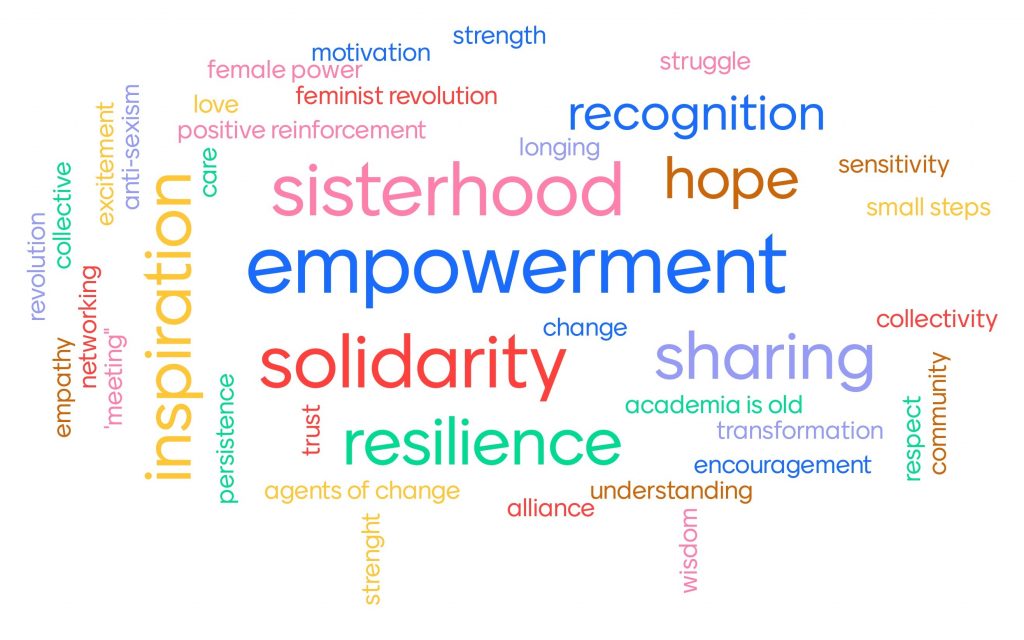
Thank you, everyone, who contributed to a wonderful three days! We hope to see you next year in Tallinn – where our third annual conference will be organized by our partner the Estonian Research Council (ETAg)!
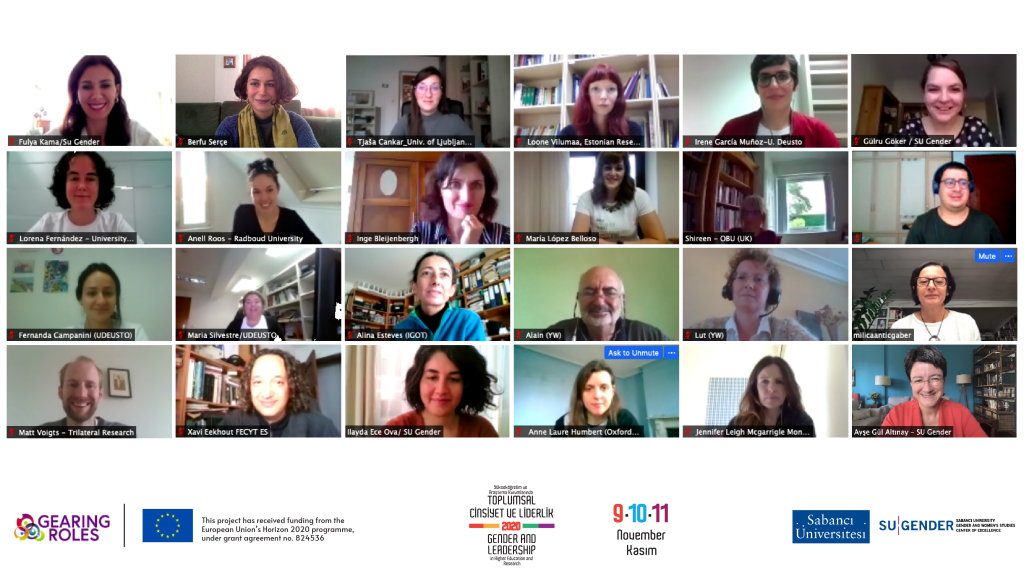
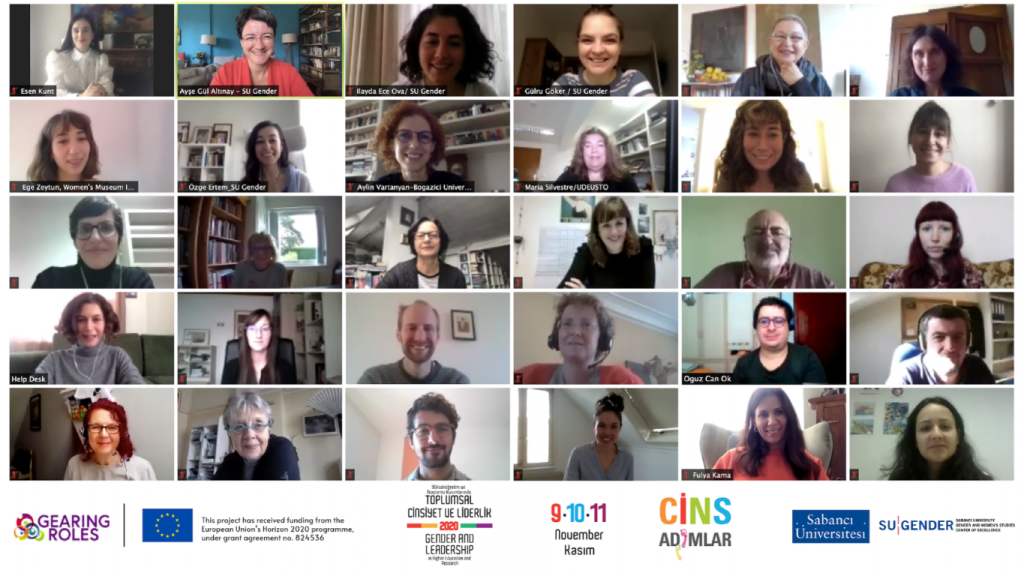




Sorry, the comment form is closed at this time.